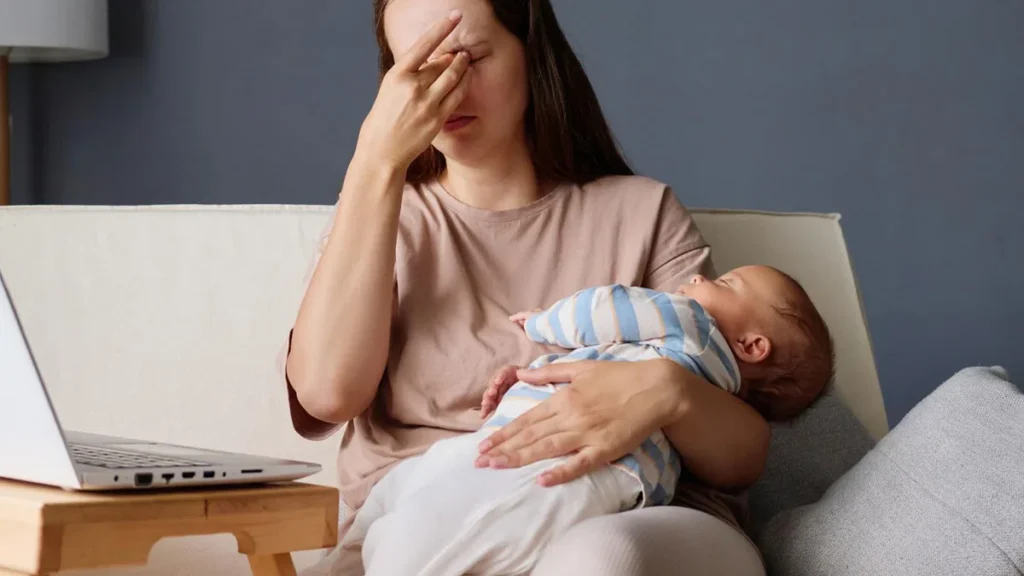
Postpartum Depression: Symptoms, Diagnosis, and Treatment
Bringing a new baby into the world is a time of excitement and joy, but for many moms, it can also be a time of worry, sadness, and even depression. Postpartum depression (PPD) is a serious condition that affects some mothers after childbirth, making it hard to feel happy or enjoy daily life. It’s not something they choose or can simply “snap out of”—it’s a medical condition that needs care and support.
In this blog, we’ll explain what postpartum depression is, how to spot it, how doctors diagnose it, and the types of treatments that can help. Knowing these things can help families and friends support a new mom in need.
Table of Contents
ToggleWhat is Postpartum Depression?
After having a baby, many moms experience “baby blues,” which can cause them to feel sad or anxious. The baby blues are common and usually go away on their own after a couple of weeks. But postpartum depression is different—it’s much stronger, lasts longer, and needs treatment.
Postpartum depression can happen because of:
- Hormone changes: Pregnancy changes hormones a lot, and after birth, these levels drop, which can affect mood.
- Physical exhaustion: Taking care of a newborn is tiring, and moms may not get enough sleep, which can make them feel worse.
- Emotional overload: There’s so much change all at once—new routines, new worries—that it can feel overwhelming.
Remember, postpartum depression is not anyone’s fault. It’s a condition that happens because of real physical and emotional changes, not because of anything the mom did or didn’t do.
Recognizing the Symptoms of Postpartum Depression
Postpartum depression has specific signs. Here’s how to tell the difference between PPD and regular “baby blues”:
- Feeling very sad or empty most of the time
- No longer finding joy in activities that once brought happiness
- Feeling exhausted and drained, even after resting
- Trouble bonding with the baby
- Feeling anxious or worrying too much
- Crying a lot without knowing why
- Anger or irritability, even over little things
Changes in eating or sleeping habits, like sleeping too much or too little
If a mom has these symptoms for more than two weeks, it might be postpartum depression. Family and friends should gently encourage her to talk to a doctor so she can start feeling better sooner.
How Postpartum Depression is Diagnosed
When a mom has symptoms of postpartum depression, an obstetrician can help by diagnosing the condition. Here’s what they might do:
- Ask questions about how she’s feeling and any symptoms she has.
- Use screening tools that ask questions to help figure out if she has postpartum depression.
- Check her health history to see if she had depression or anxiety before, which might increase her chances of having PPD.
Moms need to be honest about their feelings. Some moms feel embarrassed or worried about being judged, but doctors are there to help, not criticize. Talking openly helps the doctor find the best way to support her.

Treatment Options for Postpartum Depression
Postpartum depression is treatable, and there are several types of help available:
1. Counseling (Talk Therapy):
- Talking to a trained counselor or therapist can help moms understand their feelings and learn ways to cope.
- A common form of therapy is called cognitive-behavioral therapy (CBT), which helps change negative thoughts into positive ones.
2. Medication:
- Sometimes, a doctor might prescribe medication to help balance brain chemicals, like antidepressants.
- These medicines can help moms feel better, and many are safe to take while breastfeeding, but it’s important to discuss any concerns with the doctor.
3. Support Groups:
- Being around other moms with similar experiences can make a big difference. Support groups let moms share feelings, learn from each other, and feel less alone.
4. Self-Care Practices:
- Taking time to rest, asking for help with the baby, going for a short walk, and eating healthy meals can help moms feel a bit better day by day.
- Encourage small steps—sometimes, even a bit of sunlight and fresh air can lift someone’s mood.
These treatments, especially when combined, can really help a mom recover. The most important thing is that she knows it’s okay to seek help.
How Families and Friends Can Help
Postpartum depression doesn’t only affect the mother; it impacts the whole family. Having a strong support system is one of the best ways to help a mom with PPD. Here’s how family and friends can show support:
- Listen without judgment: Sometimes, just listening is enough. Let her talk openly about how she feels without trying to “fix” everything.
- Offer practical help: Simple things like cooking a meal, helping with household chores, or babysitting for a few hours can give her some much-needed rest.
- Encourage self-care: Remind her to take time for herself and let her know that it’s okay to rest or relax. Moms often feel guilty taking time for themselves, but a little self-care can go a long way.
- Be patient and supportive: Recovery from PPD can take time, so try to be patient and check in regularly to show you’re there for her.
By doing these things, family and friends can make a big difference. Being supportive and understanding can help a mom feel cared for, even on her toughest days.
Conclusion
Postpartum depression is a real and serious condition, but with the right help, moms can recover and feel like themselves again. If you or someone you know is going through this, remember that you’re not alone, and there is support available. Talking to a healthcare provider is the first step toward feeling better.
You don’t have to face this alone. Reaching out can make all the difference—for both moms and their families.
FAQs
Q1: How do you handle postpartum depression?
A. Treatment options include counseling, medication, support groups, and self-care. Each mom’s needs vary, so consulting a doctor is essential.
Q2: How do I know if I’m depressed?
A. Signs include persistent sadness, fatigue, and loss of interest. If these last over two weeks, consider reaching out to a healthcare provider.
Q3: What are signs of depression in a woman?
A. Common signs are sadness, irritability, fatigue, and sleep changes. Postpartum depression may also involve difficulty bonding with the baby.
